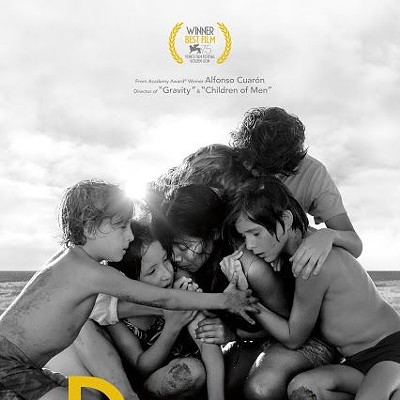Hollywood Land Before Christopher Reeve and Brandon Routh, there was George Reeves. Kirk Alyn may have originated the role of Superman on screen in a pair of 1940s serials, but it was Reeves who was most identified with the part, thanks to the hit TV series that ran throughout much of the 1950s. But in 1959, Reeves apparently committed suicide, though speculation has always run rampant that the hulking actor was actually the victim of foul play. Hollywoodland is a fictionalized take on this theory, centering on a smalltime detective (Adrien Brody) as he sets off to uncover the truth. Was Reeves (Ben Affleck) murdered by his opportunistic girlfriend (Robin Tunney), a gold digger who ran out of patience once she realized his career would never amount to more? By his older lover (Diane Lane), who feared she might be losing him for good? By the woman’s husband (Bob Hoskins), a powerful studio executive known for tying up loose ends? Or, in the final analysis, did Reeves really pull the trigger himself? Hell if anyone knows for sure, and that includes the makers of this film, who trot out every conceivable scenario without ever committing to one. Still, that’s hardly a flaw, as the open-endedness allows this handsome picture to tantalizingly jump back and forth between its colorful characters. The performances are uniformly fine -- Affleck has been a punching bag for so long now that his solid work here will surprise many -- and the movie richly offers nostalgia-twinged visions of vintage LA.
THE ILLUSIONIST Set in Austria, The Illusionist stars Edward Norton as Eisenheim, an enigmatic stage magician so skilled at his profession that the locals suspect he might actually possess otherworldly powers. One of the few skeptics is Crown Prince Leopold (Rufus Sewell), a cruel ruler who sets out to prove that Eisenheim is a fake. He enlists the aid of the corrupt Chief Inspector Uhl (Paul Giamatti), yet matters become more tangled when it’s revealed that Leopold’s fiancee (Jessica Biel) was once Eisenheim’s childhood sweetheart. For a good while, The Illusionist is topflight entertainment, with its lush period setting, its assemblage of captivating magic tricks, and a delightful relationship between Eisenheim and Uhl, two men sharing a wary respect for each other (both Norton and Giamatti are excellent). But then the film makes the fatal mistake of morphing into a mystery, the type that’s agonizingly easy to figure out even before its gears can really be placed in motion. Viewers who can’t figure out the big twist should dig out those old Encyclopedia Brown paperbacks and begin rebuilding their sleuthing skills from there.
SNAKES ON A PLANE For a while, it seemed like the greatest marketing ploy since The Blair Witch Project, as well as a revolutionary new way to make and promote movies. Come up with a catchy title, cast a way-cool actor, build the buzz over the Internet far in advance of the opening, let the online fanboys think they have a hand in actually shaping the finished product, refuse to hold critics’ screenings not because the product is unspeakably awful but because it guarantees more ink in newspapers, and then settle back as the record-breaking grosses pour in. Well, it all worked out except for that final point. The film’s lackluster box office take (no disgrace, but nothing special) should convince studios that banking on computer-weaned kids to actually leave their keyboards to venture out of the house and pay for a movie was, is and will remain a bad idea. As for the picture itself, it doesn’t quite deliver on its thrill-a-minute premise -- even star Samuel L. Jackson’s highly publicized quip about the “motherfuckin’ snakes” registers as much ado about nothing. Jackson stars as an FBI agent assigned to protect an eyewitness (Nathan Phillips) to a mob slaying; once the villains ascertain which flight they’ll be taking to make that important court date, they manage to fill the aircraft with rattlesnakes, cobras, boa constrictors. Director David Ellis and his three scripters have the title terrors chomp down on lips, eyes, breasts and even a penis, but given the overall lack of creativity invested in this project, it ultimately feels as rote and joyless as a typical slasher flick.
WORLD TRADE CENTER Oliver Stone is a divider, not a uniter. JFK alienated those who couldn’t stomach its political speculations; Natural Born Killers alienated those who found offense with its gleeful approach to serial killer shenanigans; and Alexander alienated, well, everyone with its sheer wretchedness. So the notion of Oliver Stone tackling a movie about 9/11 almost registers as a sick joke. “You think my past films were controversial?” one could almost imagine hearing him sneer. “People, you ain’t seen nothing yet!” So the most startling thing about World Trade Center is that it’s by far the least controversial movie Oliver Stone has ever made. It’s hard to find any trace of potentially incendiary material. Conversely, it’s also hard to get terribly excited over the final product. World Trade Center focuses on the Port Authority Police Department officers who would eventually be recognized as two of the only 20 people to be rescued from the rubble of the Twin Towers. September 11 begins as any other day for John McLoughlin (Nicolas Cage) and Will Jimeno (Michael Pena), but like everyone else on that fateful morning, they soon are having to digest incomplete messages involving an airplane crashing into one of the towers. Springing into action, they’re among the men who enter the building with the intention of aiding any potential survivors, even as they try to decipher additional news items suggesting that the second tower has also been hit by a plane. Timing’s not on their side, however, as the towers collapse just as they begin making their way up from the ground to the floors above. Their colleagues lose their lives, but John and Will somehow survive, though at a great price. Both men find themselves pinned -- and in great pain -- by the fallen debris, their only glimpse of the outside world a small shaft of sunlight that penetrates straight into the heart of the darkness. Realizing that it will take hours -- maybe even a day or two -- before they’re found and rescued, John and Will decide that they will count on each other’s company to survive, by talking their way through the pain and isolation until someone discovers them. Meanwhile, their wives (Maria Bello and Maggie Gyllenhaal) wait impatiently at their respective homes with other family members, eager to find out whether their spouses are dead or alive. I don’t think it’s too cynical to suggest that after the commercial and critical drubbing of Alexander, a whipped Stone was only too happy to serve up a sentimentalized tale almost certain to gain wide public approval. Working from a script by first-timer Andrea Berloff, Stone keeps his rabble-rousing methods fully in check -- even his typically frenetic shooting style has been replaced by a more somber m.o., with lengthy camera holds on saintly faces and nary a rapid jump-cut in sight. Unfortunately, the end result is a movie that feels oddly impersonal. That’s in striking contrast to this past spring’s United 93, the superb docudrama that provided audiences with a you-are-there immediacy. Every second of United 93 related in some way to the specific events of that day. On the other hand, replace the real-life characters of John McLoughlin and Will Jimeno with two fictional guys trapped in a collapsed building, and what you’re left with is a 1970s-style TV movie-of-the-week, the sort that invariably starred the likes of Christopher George or Lee Majors. For a more recent precedent, the firefighter flick Ladder 49 largely covered the same ground (in that snoozer, John Travolta and Joaquin Phoenix were the two lifesavers likewise chatting it up amid the bricks and flames). And despite the strong performances by Bello and Gyllenhaal, the numerous sequences centering on the strong-willed wives are no different than similar moments from countless WWII dramas, when the women are seen staring wistfully out of windows while their men are off trying to make the world a better place. Like United 93, World Trade Center also tries to keep politics out of the picture; instead, it focuses on the day as a shining example of American solidarity, before the government began reshaping the tragedy for its own exploitive means. Yet for all of Stone’s timidity, the material brings out some undeniable truths. The movie’s most poignant sequence comes when Stone chooses to briefly show the international community learning about this monstrous terrorist attack. It’s the moment when the U.S. had the sympathy and support of practically every country around the globe, and as we watch this segment, we’re heartbroken upon realizing how the Bush Administration has spent the last five years pissing away all that goodwill, in effect turning us into a country that’s now feared and despised rather than embraced and adored. A political perspective also appears through the character of Dave Karnes (Michael Shannon), a Marine who claims God personally ordered him to Ground Zero. Karnes is clearly a hero -- he’s the guy who found McLoughlin and Jimeno -- yet he’s also the sort of mindless warrior too easily swayed by those in charge. He swears vengeance against those who destroyed the WTC, a sentiment we can all share. Except a footnote reveals that he served two tours of duty in Iraq -- like so many others, fighting in the wrong war for the wrong reasons. Stone prefers that we don’t think too much of such sticky situations, and that’s his prerogative. This nonpartisan treatment certainly allows the movie’s wholesome humanity to shine through, which in turn leads to some strong sequences detailing the manner in which John and Will deal with their hellish situation. This is often powerful stuff, but in the final analysis, it’s still a sanitized, Hollywood version of 9/11. For a harrowing experience that feels more like the real deal, United 93 is the one to see. It hits DVD on September 5.
TALLADEGA NIGHTS: THE BALLAD OF RICKY BOBBY Like Spam, energy drinks and the music of Yanni, Will Ferrell is one of those acquired tastes that satisfy devotees while perplexing everyone else. A “B”- level Saturday Night Live player who, by virtue of one smash hit (Elf), found himself elevated to the same lofty playing field populated (presently and/or previously) by SNL superstars like John Belushi, Bill Murray and Eddie Murphy, Ferrell often seems adrift on the big screen, appearing in more flops than hits and frequently wearing out his welcome in even the smallest roles (as one example, the funny Weddings Crashers stopped dead in its tracks around the time he showed up for his extended cameo). So while some folks swear by his 2004 starring vehicle Anchorman: The Legend of Ron Burgundy, I’m not one of them. This one-note movie struck me as annoying rather than amusing, meaning I wasn’t exactly anticipating Ferrell and director Adam McKay reteaming for a comedy about a NASCAR redneck. My mistake. Talladega Nights: The Ballad of Ricky Bobby is often uproarious, and it’s clever in a way that Anchorman rarely attempted. While it never reaches the giddy highs of last summer’s premiere stupid-smart comedy, The 40-Year-Old Virgin, it’s consistently pleasurable and offers a steady stream of laugh-out-loud moments. You won’t respect yourself the next morning, of course, but while it unfolds, you’ll be happy to lower yourself to its level. Like Ron Burgundy, Ricky Bobby is also an egotistical, none-too-bright boor. “I piss excellence,” he declares, and his standing as NASCAR’s best driver certainly signals that he’s excellent at something. He has a best friend (John C. Reilly) who’s even dumber than he is, a blonde trophy wife (Leslie Bibb) who’s always looking to get ahead, and two obnoxious sons named Walker and Texas Ranger (“But we call him TR for short”). Ricky has spent his life trying to work out issues with his deadbeat dad (Gary Cole, delivering the film’s shrewdest comic performance), but that doesn’t excuse his repellent behavior and the way he takes everyone and everything for granted. Clearly, Ricky Bobby is primed to receive a comeuppance, and it arrives in the form of Jean Girard (hilarious Sacha Baron Cohen), a French homosexual race car driver whose prowess on the track leads to Ricky’s fall from grace and his subsequent (and humbled) climb back to the top.
PIRATES OF THE CARIBBEAN: DEAD MAN’S CHEST The fan frenzy surrounding Pirates of the Caribbean: Dead Man’s Chest has reached such a fever pitch that had producer Jerry Bruckheimer merely shot two hours of Johnny Depp filling out his tax returns and released it under the Pirates moniker, it still would have scored a $75 million opening weekend without breaking a sweat. Luckily for the moviegoers who turned 2003’s first installment, The Curse of the Black Pearl, into a $305 million smash, that’s hardly the case, and it’s difficult to imagine that this latest chapter won’t emerge as this summer’s top moneymaker. Yet at 145 minutes, Dead Man’s Chest ends up providing too much bang for the buck. That’s just about the same running time as its predecessor, but that film wore its length better, given that the screenplay had its hands full establishing the setting, introducing numerous characters, hammering out its weighty plot, and still finding time to include a number of action scenes that operated in the best swashbuckling tradition. Certainly, those expecting amazing feats of derring-do won’t be disappointed by this new film. The effects-driven action scenes are clearly the picture’s highlights, and they alone make Dead Man’s Chest worth the price of admission. But on the heels of Superman Returns, a movie of substance that nevertheless made sure not to skimp on its adventure quota, this one too often rings hollow. The first Pirates felt like both a stand-alone movie and the theme park attraction on which it was based; this one just feels like a roller coaster ride, full of momentary thrills but leaving little in its wake except a sudden desire to rest for a minute. It isn’t breathless as much as it grows tiresome, and it’s especially depressing to see how little the characters have been allowed to evolve. Those who found Curse’s plot a bit on the convoluted side might as well not even attempt to unscramble the goings-on this time around. But the central thrust finds Captain Jack Sparrow (Depp) tangling with the ghostly Davy Jones (Bill Nighy) in an effort to save his own soul from eternal damnation beneath the sea’s surface; it’s possible that his scheme will require sacrificing his friends Will Turner (Orlando Bloom) and Elizabeth Swann (Keira Knightley), but that’s a compromise the self-serving Jack can accept. Equally as impressive as the action scenes are the fantastical creatures that parade before our eyes. Davy Jones basically has an octopus for a face, while his crew members are just as gruesome. And for the nostalgists, there’s a formidable squid that seems to have glided right out of Disney’s classic live-action version of 20,000 Leagues Under the Sea. But the best fantasy tales are often the ones in which the special effects are subservient to the characters, not the other way around. Depp’s still a lot of fun as the scurrilous Sparrow, but a headline-grabbing performance that seemed blazingly original the first time around no longer has the power to surprise, and there’s no effort on the parts of scripters Ted Elliott and Terry Rossio to make up for that by deepening the character in any way. Bloom’s Will and Knightley’s Elizabeth are even less developed, and except for a couple of quips (him) and tirades (her), it’s hard to remember anything of substance that they do during the course of the film. Instead, it’s the makeup-sporting actors who steal this one, particularly Nighy as the ruthless Davy Jones and Stellan Skarsgard as Will’s spectral father, “Bootstrap” Turner. A word of warning: Since this is the middle film in a proposed trilogy, it follows the lead of The Empire Strikes Back, Back to the Future II and The Matrix Reloaded. In other words, there’s a beginning and a middle, but no end: In true cliffhanger fashion, the picture concludes with one final twist, requiring viewers to come back in a year to see how the storyline plays out. Here’s betting that this will be one return engagement that audiences won’t skip. ç
n

























